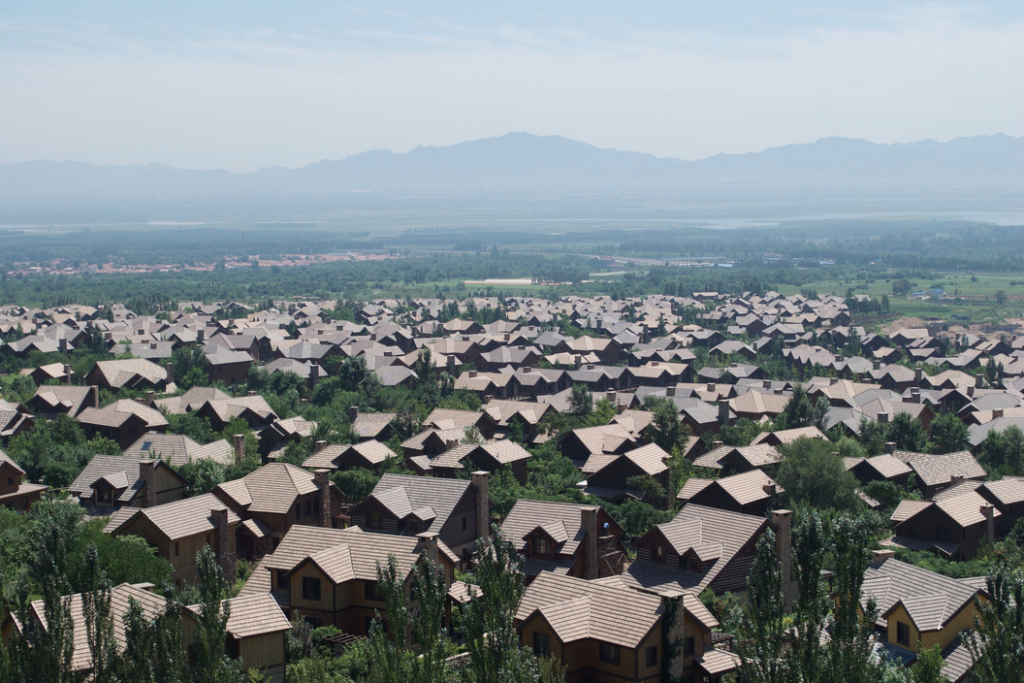Editor's Note: This interview was conducted in early March, prior to Salem Film Fest's original postponement.
Hidden among Beijing’s northern mountain range, a gated replica of the Wyoming town of Jackson Hole promises to deliver the American dream. Its several thousand Chinese residents, escapees from increasingly uninhabitable Beijing, pursue happiness, freedom, romance, and spiritual fulfillment in the Chinese reproduction of the American Wild West, only to find their dreams of living an American life in China is fraught with complications.
SFF Blog contributor Theresa Mitchell spoke with Director Adam James Smith ahead of the festival – AMERICAVILLE streams during Week 3 (Friday, July 24 – Thursday, July 30) of our virtual Salem Film Fest and tickets can be purchased here.
Theresa Mitchell: What brought you to Jackson Hole, Hebei? How did you meet Liu Hua?
Adam James Smith: I make films almost exclusively in China on new towns and cities being built. My first feature documentary film, THE LAND OF MANY PALACES explored the well-documented rural to urban migration in China. With my follow-up film I decided to explore the less documented opposite movement of wealthy urban elites moving into China’s rural hinterlands, specifically Beijingers moving to the replica of Jackson Hole built two hours north of the city. This unique place also presented an opportunity to explore the collision of American and Chinese cultures in one very unique location at a time when US-China relations are becoming increasingly fraught.
I was especially keen to focus on a main protagonist in this documentary and to follow a somewhat conventional call to adventure/quest for happiness story - as this is so intertwined with the story of America and what it means to live the American dream. I met Liu Hua through the real estate agent who sold her a house in Jackson Hole and in her I found someone who was hanging many hopes and expectations on this town, that it would deliver happiness, freedom, romance, and spiritual fulfillment.
TM: Why did you decide to title the film Americaville?
AJS: I wanted to make a link between the Chinatowns in the West and this replica American town in China, however, "Americatown" sounded a bit clunky, so I settled on “Americaville.”
TM: In the film Jackson Hole acts primarily as a backdrop to Liu’s own story and struggles. Why was it important for you to give Liu’s perspective on the Jackson Hole community?
AJS: Residents of Beijing move to Jackson Hole for various reasons - to own a large home and garden, to escape the pollution and overcrowding in the downtown area of the city, to be a part of a close-knit community, and for other practical reasons. In Liu Hua though, I saw someone who wanted all of those things, but more importantly, saw Jackson Hole as a last chance at realizing happiness. It was important for me to tell the story of Jackson Hole through someone who believed in this place so deeply and was invested in its success.
TM: Has this film screened for the community in Jackson Hole, Hebei? Has it screened in Jackson Hole, Wyoming? What has the overall reception been so far?
AJS: I screened the film in the original Jackson Hole in Wyoming a few weeks ago and locals were fascinated and puzzled. The original town has started to receive a huge influx of Chinese tourists in recent years, so many in the town were curious as to why the Chinese find Jackson Hole to be such an appealing place to visit and, indeed, replicate.
It’s important for me to be there to see and hear the responses and to answer questions if and when I do screen in the Chinese replica of Jackson Hole. I haven’t been able to visit China yet since releasing the film earlier in the year, but if I get a chance later this year, I’ll set up a screening for the community.
TM: What were the logistical differences between shooting in Beijing versus shooting in Jackson Hole?
AJS: In terms of permissions, Jackson Hole should have in theory been simple to film in as they have their own police force and government and the founder/figurehead of the town approved of the project. However, many of the people living in Jackson Hole were elite and quite secretive so I sometimes ran into issues where I would be filming a gathering or public event and someone would have issues with me filming. Chinese people are generally quite cautious about being on camera. Originally I imagined Beijing city would have been harder to film in as it’s under the direct control of the central Chinese government, though actually it wasn’t so bad. There are a lot of foreign people in Beijing now and it’s a city so full of tourists, so I guess people usually assume you’re a tourist if they see you with camera equipment, so most of the time you aren’t bothered by the authorities. This, of course, isn’t the case elsewhere in China.
TM: How do you think your perspective as a Brit who moved to the U.S. shaped your ability to approach this community?
AJS: Growing up in the UK, I dreamed of moving to the United States one day. I also developed an interest in China from a young age as my father worked in the country and would return from trips and talk about his experiences in China around the kitchen table. I think one of the main commonalities I shared with the Chinese residents of Jackson Hole, China was a shared interest and enthusiasm for the American dream and American culture as a non-American. This is ultimately how I connected with my subjects in Jackson Hole.
TM: Did you have conversations with the subjects of the film about the realities in America that contrast with the idealized versions being sold by the real estate developers?
AJS: Yes, I did. During the production of the film, there were several mass shootings and racial tensions across the US, droughts and major fires in California, and the election of Donald Trump. The version of the US they’ve imagined in Jackson Hole, China is largely free from problems. It is afterall, an affluent gated community, where everything is controlled and manicured. It’s perhaps some kind of throwback to the 1950s with a selective fixation of certain aspects of American society that appeal to Chinese tastes. I did ask around extensively what their thoughts and understandings about America were. Many of the residents I encountered prefered Jackson Hole, China to the real America as they viewed it as safer and a version of American life better tailored to Chinese sensibilities.
TM: What impact do you hope this film has?
AJS: I hope the film will act as a kind of mirror for American audiences - that it will allow viewers here to see their culture and their nation in a new way, from an outsider’s point of view.
AMERICAVILLE screened as part of SFF 2020.






